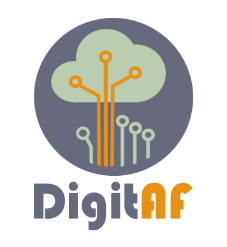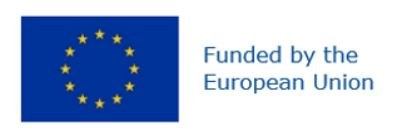Cluster 6 - DigitAF
DigitAF (DIGItal Tools to help AgroForestry meet climate, biodiversity and farming sustainability goals: linking field and cloud) is a European Union Horizon project focusing on agroforestry and aims to improve the knowledge around the topic to improve agroforestry systems. It will scale up and boost agroforestry in the EU by defining the right conditions for its high-quality implementation. 26 partners (and 5 affiliated entities) spread over 19 (and 4 associated) countries will work on this project. The project is coordinated by Marie Gosme (INRAE) and will run from July 2022 to June 2026.
Today’s farmers mainly focus on one crop, especially regarding one field. This approach is easy to manage, but a massive gamble as well as yields can fail or prices can suddenly drop. Besides, it contributes to a lesser complex landscape, disturbing several ecosystem services. Agroforestry, a land use system integrating trees or shrubs in agricultural fields, allows farmers to grow multiple products on one field. The system has already proven to possess potential for agricultural sustainability, climate change mitigation, biodiversity preservation and soil conservation. Although, these performances are context dependent. Furthermore, research has proven that scaling up agroforestry practices is a difficult process. This project will try to target those bottlenecks.
DigitAF’s aim is to boost agroforestry implementation in the EU thanks to the development of digital tools tailored to the needs and concerns of stakeholders. Furthermore, it aims on a better legal framework and will try to establish communication and information systems on which farmers can rely. DigitAF will contribute to overcome socio-technical challenges through the set-up and maintenance of six Living Labs. These will also be used to validate the provided digital tools.
An important aspect of the project is that all outputs are open access oriented to create a legacy for future researchers and stakeholders, enabling them to furtherly use and develop the created tools during the project and strengthening partnerships in future projects.
Objectives
The specific objectives of DigitAF are to:
- Support policy actors at different scales to design more efficient and effective policies.
- Support agroforestry practitioners in designing and managing systems to optimize agronomic, economic, social, and environmental performances.
- Allow actors in agroforestry value chains to verify and market agroforestry benefits, including several ecosystem services enhanced biodiversity, carbon sequestration, soil health.
- Support consumers seeking good value and environmentally beneficial products.
- Contribute to overcoming socio-technical lock-ins through the set-up and operation of six living labs across EU, gathering stakeholders involved in agroforestry implementation.
- Provide current and future researchers and software developers with FAIR (findable, accessible, interoperable, and reusable) open platform protocols to encourage data sharing and software interoperability using existing ontologies, standards, and databases and foster open science practices.
- Give agroforestry a top of mind of decision-makers among the possible solutions to improve agricultural sustainability and resilience to climate change.
Role of Ghent University
Ghent University employs a PhD student on the topic and will lead the process to establish a credit point index tool regarding biodiversity, based on literature research, balancing robustness with simplicity and combining analysis of habitat type with adjustments for location and condition. The biodiversity tool will then be evaluated in several European regions.
Website
Contact
Prof. Kris Verheyen
Department Environment
Phone number: +32 9 264 90 27
E-mail
Funding info
Disclaimer
Funded by the European Union. Views and opinions expressed are however those of the author(s) only and do not necessarily reflect those of the European Union or the European Research Executive Agency (REA). Neither the European Union nor the authority can be held responsible for them.


